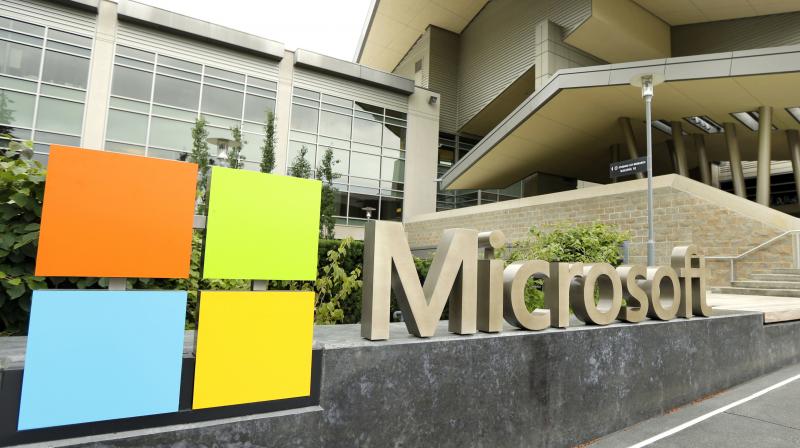Microsoft tops USD 1 trillion as it predicts more cloud growth

Microsoft Corp on Wednesday briefly topped USD 1 trillion in value for the first time after executives predicted continued growth for its cloud computing business.
The Redmond, Washington-based company beat Wall Street estimates for quarterly profit and revenue, powered by an unexpected boost in Windows revenue and brisk growth in its cloud business which has reached tens of billions of dollars in sales.
Microsoft shares rose 4.4 per cent to USD 130.54 in late trading after the forecast issued on a conference call with investors, pushing the company ahead of Apple Inc’s USD 980 billion market capitalization. The companies and Amazon.com Inc have taken turns in recent months to rank as the world’s most valuable US-listed company.
Microsoft’s stock has gained about 23 per cent gain so far this year, after hitting a record high of USD 125.85 during regular trading hours.
Under Chief Executive Satya Nadella, the company has spent the past five years shifting from reliance on its once-dominant Windows operating system to selling cloud-based services.
Azure, Microsoft’s flagship cloud product, competes with market leader Amazon Web Services (AWS) to provide computing power to businesses.
Chief Financial Officer Amy Hood told investors that Microsoft expects to see growth in the fiscal fourth quarter in the business divisions in charge of Azure and Office 365, an online version of its longtime productivity software.
For the third quarter ended March 31, Azure’s growth slowed slightly to 73 per cent, down from 76 per cent in the second quarter. Mike Spencer, Microsoft’s head of investor relations, said the decline was roughly in line with the company’s estimate.
Christopher Eberle, a senior equity analyst with Nomura, said that with Azure, “one should assume a slower rate of growth as we move forward, simply due to the law of large numbers.” Still, Azure will bring in USD 13.5 billion in sales in fiscal 2019 with an overall growth rate of 75 per cent, he estimated. “I can’t name another company of that scale growing at these rates.”
Microsoft tops tech rivals such as Amazon in market capitalization on some days despite having less revenue, partly because most of its sales go to businesses, which tend to be steadier customers than consumers. A growing proportion of Microsoft’s software sales are billed as recurring subscription purchases, which are more reliable than one-time purchases.
Microsoft’s earnings per share of USD 1.14 beat expectations of USD 1, according to IBES data from Refinitiv.
Windows licensing revenue from computer makers grew 9 per cent year over year, beating expectations after a 5 per cent decline in the previous quarter. Spencer said a shortage of Intel Corp processor chips for PCs that many analysts expected to last into this summer had been resolved earlier than expected, allowing PC makers to ship more machines.
Microsoft’s “commercial cloud” revenue - which includes business use of Azure, Office 365 and LinkedIn - was USD 9.6 billion this quarter, up 41 per cent from the previous year but down slightly from the 48 per cent growth rate the previous quarter.
Microsoft’s so-called “intelligent cloud” unit, which contains its Azure services, posted revenue of USD 9.65 billion, above Wall Street estimates of USD 9.28 billion, according to IBES data from Refinitiv. Microsoft’s Hood said that unit could reach USD 11.05 billion in revenue in the fiscal fourth quarter.
The “productivity and business process” unit that includes both Office as well as social network LinkedIn had USD 10.2 billion revenue versus expectations of $10.05 billion. Hood forecast up to USD 10.75 billion in revenue for the unit for the fourth quarter.
Microsoft’s latest results contained two weak spots.
Its gaming revenue was up only 5 per cent versus 8 per cent the quarter before, which Spencer attributed to less revenue from third-party game developers and the fact that many gamers are delaying purchases of Microsoft’s Xbox console because a new model is expected soon.
Sales of the company’s Surface hardware grew 21 USD versus 39 USD the quarter before, also because customers waited for updated hardware they expected to be released soon.
Total revenue rose 14 per cent to USD 30.57 billion, beating analysts’ average estimate of USD 29.84 billion, according to IBES data from Refinitiv.
Net income rose to USD 8.81 billion, or USD 1.15 per share, from USD 7.42 billion, or 96 cents per share, a year earlier.

